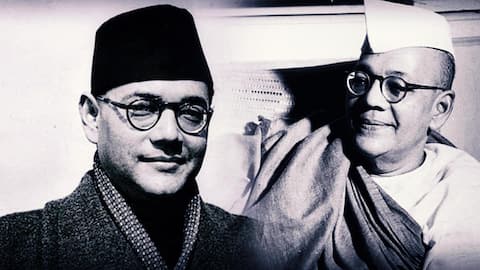Netaji Subhas Chandra Bose's birth anniversary: Facts about his life
What's the story
Among India's most renowned independence warriors, Subhas Chandra Bose had a powerful global impact. Born on January 23, 1897, he was the driving force behind the Azad Hind Fauj's establishment. Let us reflect on the remarkable Netaji Subhas Chandra Bose was—a man of immense depth, profound knowledge, tremendous brilliance, and a captivating persona—as we honor him on his 127th birth anniversary.
Fact 1
Netaji was a brilliant student, ranked 4th in ICS exam
Netaji was an exceptional student on the academic front. In 1919, he ranked fourth on the esteemed Indian Civil Services examination, but he eventually left his government job to fight for India's independence within a year. He was presented by his mentor Chittaranjan Das as the editor of the publication "Forward." The freedom fighter also founded a newspaper called "Swaraj."
Fact 2
He was imprisoned 11 times, yet that didn't stop him
Throughout his fight for freedom, Netaji Subhas Chandra Bose was imprisoned 11 times! Yet, the legend was unfazed by his repeated jail terms for his anti-British rule efforts. All this happened between 1921 to 1941. According to reports, accusing Professor Oaten of mistreating Indian students and uttering anti-Indian slurs at Presidency College, he showed his first act of anti-British rebellion.
Fact 3
Mahatama Gandhi used to call Bose 'Patriot of Patriots'
Mahatma Gandhi referred to Subhas Chandra Bose as the "Patriot of Patriots," despite the latter opposing the former's approaches and ideologies. Given Bose's unwavering commitment to India's independence, this honor was well-deserved. He made every sacrifice possible for his country. During the struggle for independence, his well-known catchphrase, "Tum mujhe khoon do, main tumhe aazdi dunga," inspired Indians to be patriotic.
Fact 4
His death remains one of the biggest mysteries
One of the greatest mysteries in India has been the cause of Netaji's death. After his overloaded Japanese jet crashed over Taiwan, he was reported to have died from third-degree burns. Conspiracy theories, however, have persisted ever since his followers instantly denied the news. It was believed that he stayed in Uttar Pradesh disguised as a sadhu. He was referred to as Gumnami Baba.
Fact 5
Established India's first free government at Andaman and Nicobar Islands
Bose is credited for forming the first independent Indian government in Andaman and Nicobar in 1943. With Japanese support, he revitalized the Indian National Army (INA) using Indian prisoners of war. A Provisional Government of Free India, nominally presided over by Bose, was declared on the Japanese-occupied Andaman and Nicobar Islands. He first hoisted the tricolor at the current Indian flag spot in Andaman.
